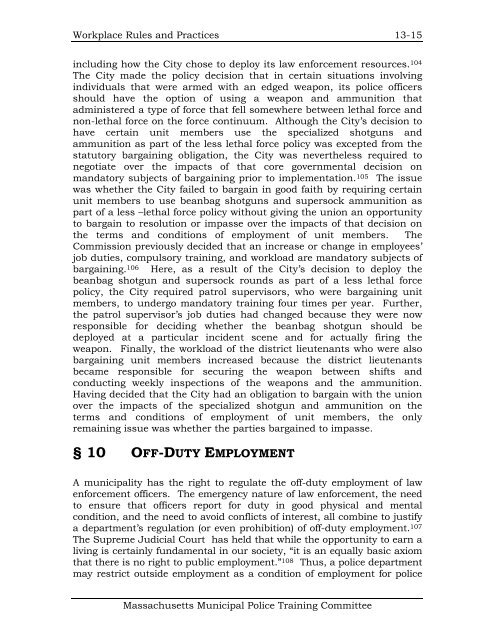Management Rights - AELE's Home Page
Management Rights - AELE's Home Page
Management Rights - AELE's Home Page
You also want an ePaper? Increase the reach of your titles
YUMPU automatically turns print PDFs into web optimized ePapers that Google loves.
Workplace Rules and Practices 13-15<br />
including how the City chose to deploy its law enforcement resources. 104<br />
The City made the policy decision that in certain situations involving<br />
individuals that were armed with an edged weapon, its police officers<br />
should have the option of using a weapon and ammunition that<br />
administered a type of force that fell somewhere between lethal force and<br />
non-lethal force on the force continuum. Although the City’s decision to<br />
have certain unit members use the specialized shotguns and<br />
ammunition as part of the less lethal force policy was excepted from the<br />
statutory bargaining obligation, the City was nevertheless required to<br />
negotiate over the impacts of that core governmental decision on<br />
mandatory subjects of bargaining prior to implementation. 105 The issue<br />
was whether the City failed to bargain in good faith by requiring certain<br />
unit members to use beanbag shotguns and supersock ammunition as<br />
part of a less–lethal force policy without giving the union an opportunity<br />
to bargain to resolution or impasse over the impacts of that decision on<br />
the terms and conditions of employment of unit members. The<br />
Commission previously decided that an increase or change in employees’<br />
job duties, compulsory training, and workload are mandatory subjects of<br />
bargaining. 106 Here, as a result of the City’s decision to deploy the<br />
beanbag shotgun and supersock rounds as part of a less lethal force<br />
policy, the City required patrol supervisors, who were bargaining unit<br />
members, to undergo mandatory training four times per year. Further,<br />
thepatrol supervisor’s job duties had changed because they were now<br />
responsible for deciding whether the beanbag shotgun should be<br />
deployed at a particular incident scene and for actually firing the<br />
weapon. Finally, the workload of the district lieutenants who were also<br />
bargaining unit members increased because the district lieutenants<br />
became responsible for securing the weapon between shifts and<br />
conducting weekly inspections of the weapons and the ammunition.<br />
Having decided that the City had an obligation to bargain with the union<br />
over the impacts of the specialized shotgun and ammunition on the<br />
terms and conditions of employment of unit members, the only<br />
remaining issue was whether the parties bargained to impasse.<br />
§ 10 OFF-DUTY EMPLOYMENT<br />
A municipality has the right to regulate the off-duty employment of law<br />
enforcement officers. The emergency nature of law enforcement, the need<br />
to ensure that officers report for duty in good physical and mental<br />
condition, and the need to avoid conflicts of interest, all combine to justify<br />
a department’s regulation (or even prohibition) of of-duty employment. 107<br />
The Supreme Judicial Court has held that while the opportunity to earn a<br />
living is certainly fundamental in our society, “it is an equaly basic axiom<br />
that there is no right to public employment.” 108 Thus, a police department<br />
may restrict outside employment as a condition of employment for police<br />
Massachusetts Municipal Police Training Committee
















